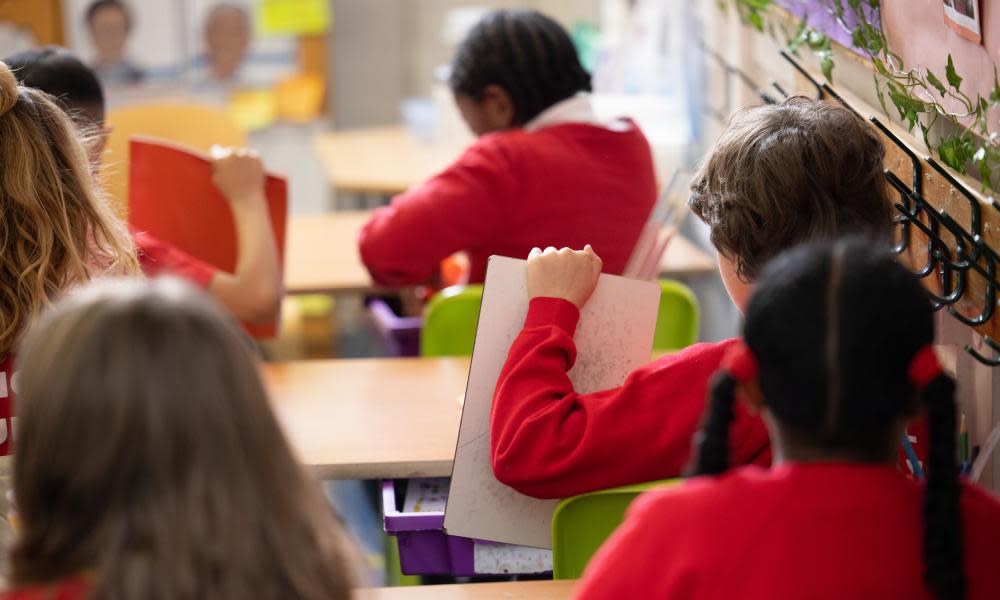WHO Europe: jab young children to cut Covid risk at Christmas

Mass vaccination drive could cut risk of Covid surge in older relatives over holiday season, WHO says
European governments should consider mass vaccination programmes for primary school children given the risk of grandparents being infected with Covid over the holiday season, the World Health Organization has said.
Hans Kluge, the WHO’s Europe director, said it was “not unusual” for the level of infection in schools to be two to three times higher than that found in the general community.
The WHO has long championed the need for children to stay in school, but Kluge said the level of infection had to be addressed through the use of masks, ventilation and potentially vaccination programmes for the young.
“As school holidays approach, we must also acknowledge that children contaminate their parents and grandparents at home,” Kluge said. Those groups are 10 times more likely to develop severe disease, be hospitalised or – if unvaccinated – die, he said.
“The use of mask and ventilation and regular testing should be a standard at all primary schools. And vaccinating children should be discussed and considered nationally as part of school protection measures.
“Vaccination of younger children not only reduces their role in Covid-19 transmission, but also protects them from paediatric severity whether associated with long Covid or multi-system, inflammatory syndromes.”
The Medicines and Healthcare products Regulatory Agency in the UK is currently reviewing the safety of a Pfizer/BioNTech vaccine designed for children aged five and above. The government’s Joint Committee on Vaccination and Immunisation (JCVI), responsible for approving vaccine programmes, is also currently examining data as a “matter of urgency” in order to be able to respond quickly should there be regulatory approval.
But the European Medicines Agency, the US Food and Drug Administration (FDA) and the regulator in Australia have all already authorised the vaccine for young children, raising concerns that the UK is being slow to act.
default
Young children started receiving doses in the US at the start of last month. On Tuesday, Spain’s public health commission approved the use of the Covid vaccine on children aged five and above from 15 December and Italy’s government has said it will roll out its programme later this month, with other EU capitals expected to follow suit.
Dame Rachel de Souza, the children’s commissioner for England, said at the weekend she believed primary school school wanted to be vaccinated in order to protect their parents and grand parents from infection.
All children aged 12 to 15 years in the UK are supposed to have been offered a vaccine jab although the level of coverage has been found to vary widely around the country.
In further comments at a virtual press briefing from Copenhagen, Kluge, a Belgian doctor and public health expert, also cautioned against rushing to making vaccination mandatory given the risk to public acceptance.
The Greek government is fining people aged 60 and above for failure to receive a vaccine jab and Germany is expected to hold a vote on compulsory vaccination early next year.
Kluge said: “Mandates around vaccination are an absolute last resort and only applicable when all other feasible options to improve vaccination uptake have been exhausted. They have proven effective in some environments to increase vaccine uptake. But the effectiveness of mandates is very context specific.”
Kluge said it would become clear that countries that dealt well with the Delta variant would be well positioned to cope with the new challenges.
Concerns were raised on Wednesday at the identification of 17 Omicron cases in Norway, many of which have been linked to a super spreader event at a nightclub in the capital. Amid concern over rising hospitalisations, combined with the impending flu season, the Norwegian government is expected to announce new restrictions on Tuesday evening.
In the last 24 hours, Norway reported 4,117 Covid infections, an increase of 1,240 compared with the same day last week. Most striking, however, has been the outbreak linked to a Christmas dinner at Oslo’s Louise nightclub, which has resulted in 130 Covid cases. Norwegian media quoted Tine Ravlo, an infection control doctor, suggesting half of the infections could be the Omicron variant.
The club had been booked by Scatec, a renewable-energy company, for its Christmas party, despite the fact that only vaccinated employees were invited and had been required to take a rapid test the day before. It appears now that some guests had recently returned from South Africa and may have been infected there.
Meanwhile, Dr Catherine Smallwood, the senior emergency officer at the WHO regional office for Europe, said 43 countries in the European region had imposed travel restrictions because of Omicron but that this would prove ineffective in halting the spread.
“Disease outbreaks are contained at their source, not at their borders,” she told the press briefing. “And travel bans, though they may be easily accessible in terms of political decision-making, they are not effective in preventing spread of disease. They really are not effective.”

 Yahoo News
Yahoo News 
